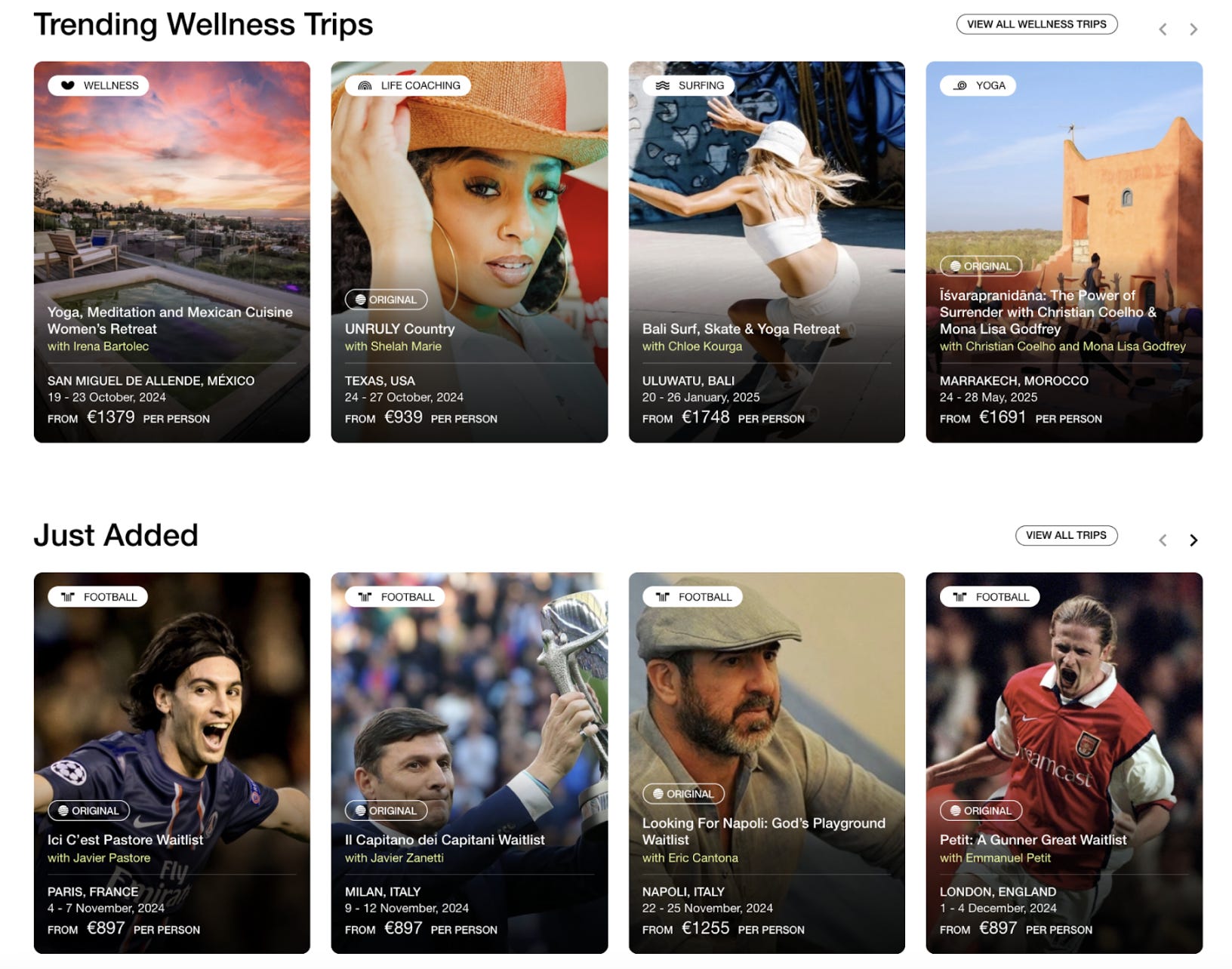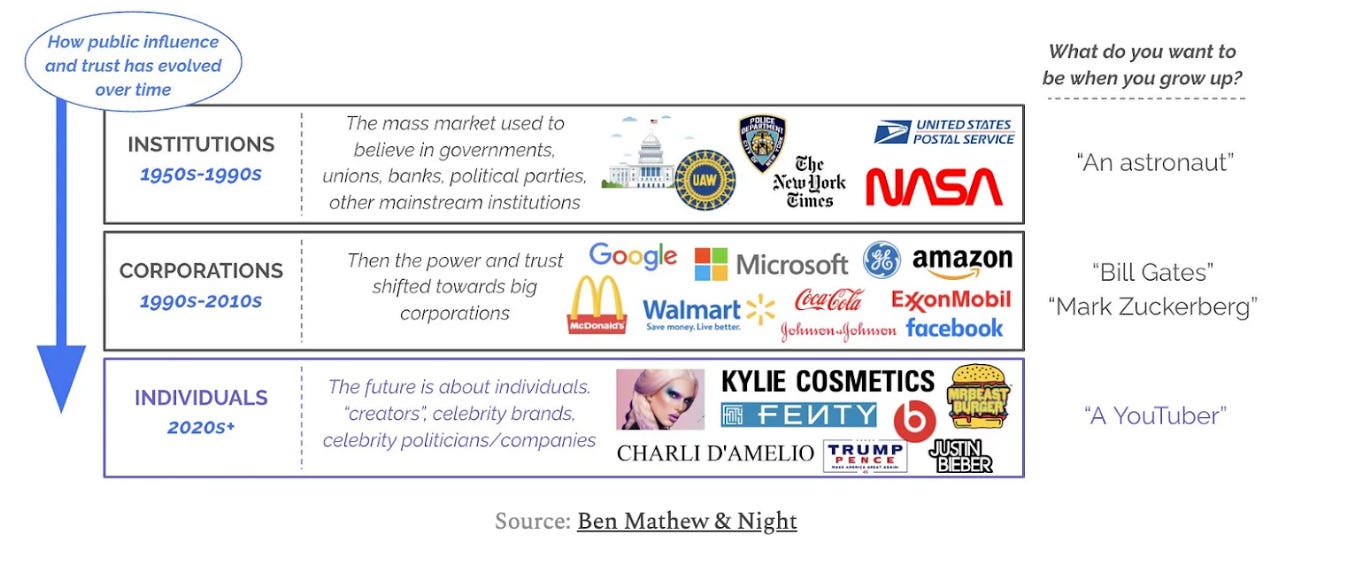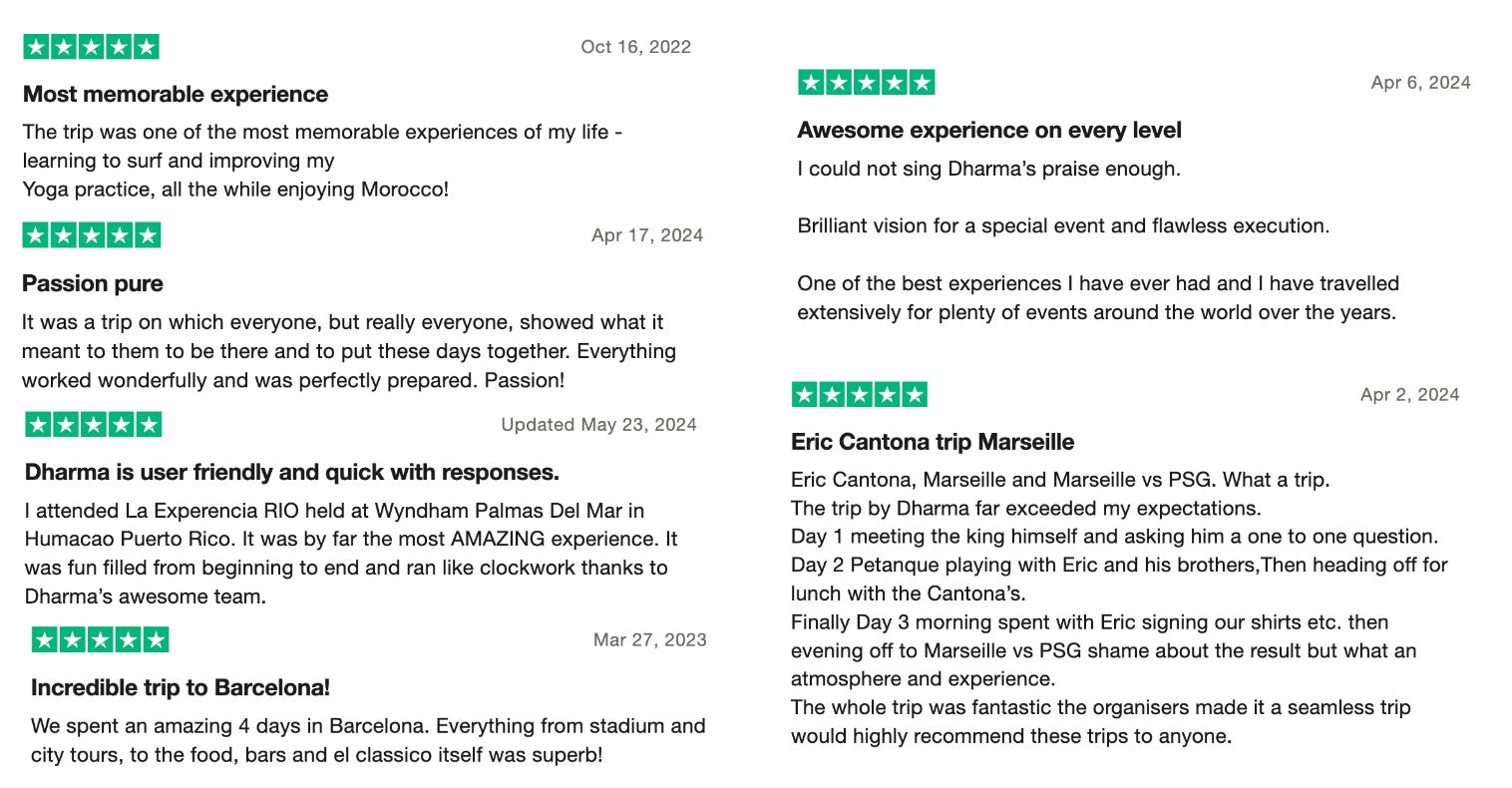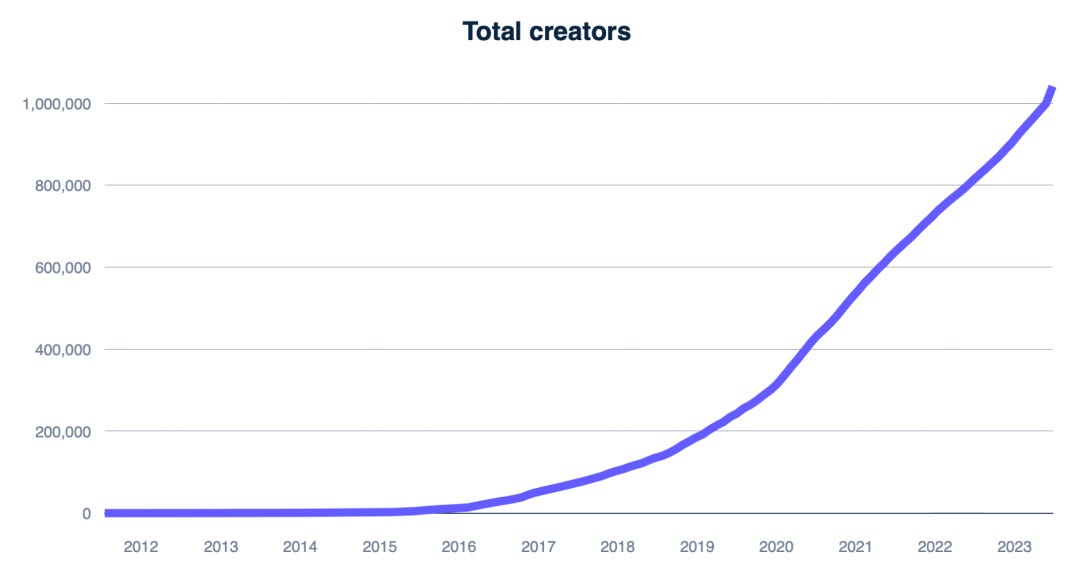Dharma and the Rise of Passion-Led TravelIntroducing Deep Dives: a new chapter for Travel Tech EssentialistWelcome to the first-ever sponsored deep dive on Travel Tech Essentialist! This new series will feature around six deep dives per year, each one focusing on a single, standout company or startup shaping the future of travel tech. These pieces will be free for all Travel Tech Essentialist subscribers, and are designed to go beyond surface-level analysis, offering a deep look at the stories, strategies, and insights from across the industry. For more on how I select these companies and why I believe they bring unique value, check out my deep dive philosophy. Today, we’re kicking off with Dharma, a company I’ve been following closely since 2020, when I first connected with its founder, Charaf El Mansouri. Over the years, I’ve watched them redefine travel through passion-led journeys. Headquartered in Abu Dhabi as one of the first startups to join Mubadala’s Hub71 program, Dharma operates as a fully remote company. Let’s dive in. The Secular Pilgrimage: The Rise of Passion-Led TravelIn the past decade, travel has experienced a shift, moving from destination-led experiences to journeys shaped by personal passions and interests. This became even more pronounced after the pandemic, as lockdowns and travel restrictions pushed travelers to rethink how and why they travel. Today’s travelers, particularly Gen Z and Millennials, look for more profound and meaningful experiences that align with their values and passions instead of checking off bucket-list destinations. The emergence of passion-led journeys, where the “why” behind travel matters more than the “where,” is fundamentally reshaping the tourism industry. Dharma, a company at the forefront of this new travel paradigm, is capitalizing on this shift by offering unique, transformative travel experiences curated around passions and communities rather than just locations. Dharma trips are immersive journeys hosted by some of the world’s most inspiring individuals, from football legends to wellness leaders. By blending the influencer economy with purpose-driven journeys, Dharma is redefining what it means to travel in the 21st century, pioneering a travel experience the company calls 'the secular pilgrimage'. This is the first time in history where non-travel professionals, be they chefs, yoga teachers, or street artists, can plan and sell trips for their communities. Dharma’s strategic framework is centered on creating ‘unique content’: one-of-one travel experiences curated and hosted by influencers, brands, and experts. This concept of unique content is becoming the new battleground for OTAs (online travel agencies) and travel companies as they seek to differentiate themselves in a crowded marketplace. In the age of AI and automation, where algorithms increasingly dictate everything from our media consumption to our shopping habits, one thing remains clear: content is still king, especially in travel. Dharma is laser focused on humanizing the travel experience in a way that no algorithm can replicate. This is a deep dive into Dharma’s story, exploring its strategy, challenges, and vision for the future. It covers:
With this structure, we’ll explore how Dharma is not only capitalizing on the rise of passion-led travel but also redefining what it means to explore the world in the 21st century. Let’s dive in. From Destination-Led to Passion-Led TravelFor decades, traditional tourism was all about the destination. People traveled to places like Paris, New York, or Tokyo simply because they were iconic. The allure was about where you went, not necessarily why. But this model has slowly eroded, especially among younger generations, who see travel as a gateway to self-discovery and personal enrichment. A Thrillist survey of 2000 Gen Z and Millennials found that 72% view travel as core to their identity, and 88% see it as essential for personal growth. They seek experiences that go beyond sightseeing and immerse themselves in personal passions like wellness, art, food, and football. For these travelers, it’s less about visiting the Eiffel Tower and more about attending a wellness retreat with a beloved yoga instructor or meeting their football idol in person. Dharma is pioneering the model that taps directly into this passion-driven travel market in the hopes of creating and then dominating this nascent space. The company was born from a personal realization by its founder, Charaf El Mansouri, who experienced the powerful pull of passion-led travel firsthand. After watching an episode of Netflix’s Chef’s Table, Charaf and his wife were compelled to travel to South Korea to visit a remote temple and experience the culinary mastery of Jeong Kwan, a monk featured in the show. When they arrived, they realized they weren’t alone; other travelers had been similarly moved by the episode. This was the revelation: media and influencers are emerging as the primary motivators for travel decisions. Rather than choosing a destination, travelers are choosing a purpose, which is often influenced by the content they consume—whether it’s a Netflix show, a YouTube video, or an Instagram post. Dharma was founded to offer curated experiences that eliminate the friction from passion-led journeys and create ‘secular pilgrimages.’ As Charaf puts it:
This shift goes beyond the ‘travel like a local’ mantra popularized by Airbnb. While that approach focused on staying in authentic accommodations and exploring neighborhoods, today’s travelers are seeking deeper, more immersive experiences that resonate with their personal identities. Transforming Travel Through Unique ContentAt its core, Dharma’s mission is to create transformative travel experiences that foster a sense of belonging and community. The company’s vision is rooted in Charaf’s family background in hospitality, which spans three generations, and a belief that travel should be centered around human connection rather than just locations. His family’s involvement in hospitality began after the French colonization, when his grandfather became the first local owner of a luxury hotel in Oujda, Morocco. This heritage shaped his understanding of hospitality as more than just a service; it’s about creating meaningful, lasting connections between people. This philosophy is at the heart of Dharma, where each trip is designed to forge deep bonds between travelers and their hosts. Dharma’s strategic focus is to scale its offering of ‘one-of-one’ trips that are unlike anything else on the market. With over $10.5 million raised from prominent investors like FJ Labs, Stephen Ross, and Convivialité Ventures, Dharma is well-positioned. As of the end of September, Dharma has $5 million in unique supply¹ listed on its website, growing supply 25% month-over-month this year, and has signed over 150 talented and inspirational hosts.
Dharma’s experiences are carefully curated to resonate with diverse audiences, each trip designed to reflect the passions and identities of its participants. For instance, the wellness-themed trips attract a predominantly US-based, female audience, while the football-themed experiences appeal largely to EU-based, male travelers. Despite these differences, the core of Dharma’s offering remains consistent: bringing people together through shared passions and purpose. From a philosophical standpoint, Charaf describes the category Dharma operates in as Pilgrimage Travel, a secular form of pilgrimage. With more and more people feeling disconnected from traditional sources of identity such as extended family, religion, and nation, there is an increasing need for experiences that provide a sense of belonging and significance. Dharma’s mission is to address this need by creating opportunities for people to experience moments of deep connection and community. Customer reviews reveal a common thread of emotions: joy, connection, human warmth, belonging, and gratitude. These shared experiences validate Dharma’s belief that travel can be a powerful tool for healing and personal growth. This focus on content as the core differentiator is critical. In today’s saturated travel market, Dharma is competing with unique supply that can’t be replicated. Unlike traditional OTAs that focus on mass-market, cookie-cutter packages, Dharma’s strength is in its ability to design each trip around a specific passion or community. Whether a football pilgrimage with Eric Cantona or a wellness retreat led by Shelah Marie for her community centered around Black women empowerment, Dharma’s offering is travel and content. A compelling narrative that draws people in. Scaling to $1B in Unique ContentWith a $6 million revenue target for 2024 and over 100 creators already on its platform, Dharma’s potential value lies in its ability to scale its unique supply by sourcing and onboarding new hosts who align with the company’s values and can offer truly transformative experiences. The company aims to list over 250 trips with world-renowned influencers, artists, and brands by the end of this year and build a $1 billion inventory of unique travel content by 2026, firmly positioning itself as a major player in passion-driven travel. Charaf describes Dharma’s goal of reaching $1 billion in unique content as more than a financial target. It’s about building a defensible moat around the business by offering something no platform can easily replicate. This focus on content differentiation and content as king will allow Dharma to stand out in an increasingly crowded travel market. Dharma is creating a playbook to expand its model across new regions and verticals such as food and music. Each of these partnerships drives bookings but more importantly, creates brand equity for Dharma as the go-to platform for passion-led, experiences. The Competitive LandscapeAs Dharma scales its vision of creating a $1 billion inventory of unique travel content, it does so in a competitive landscape that includes traditional multi-day trip OTAs, emerging Travel Creator platforms, and DIY creator-led experiences. Multi-day trip OTAs like TourRadar and BookRetreats offer a wide range of tours and tend to focus on broad, destination-based experiences. Creator travel platforms such as TrovaTrip and Tourhero enable influencers to organize community-led trips and DIY experiences, such as independent yoga retreats, are deeply personal but lack the resources and support of a platform. Dharma’s approach combines the best of all these worlds while adding its own innovative spin by building a robust inventory of curated, one-of-one trips that blend the intimacy of creator-led experiences with the scalability of a major travel platform. The company has a meticulous approach to developing new partnerships, refining trip concepts, and expanding into new verticals is designed to build a defensible moat around its business. As Charaf puts it, “Our hyper-focus on supply and our rigorous testing and iteration process are what differentiate us. We’re not just enabling travel experiences; we’re creating a whole new category of travel.” Turning Influencers into Travel BrandsOne of the most revolutionary aspects of Dharma’s business model is how it leverages the creator economy to fuel its growth. As traditional brands increasingly compete with the direct connection influencers have with their communities, Dharma has positioned itself as the platform that enables influencers to turn their followings into travel brands. But it didn’t start that way. The story of Dharma began in London, where Charaf and his wife Nisma originally founded the company as a DTC luxury yoga travel brand. They hired Mona Lisa Godfrey, a Wanderlust and Lululemon ambassador with a dedicated following, and launched their first retreat with a DTC marketing campaign. The result? No sales. It quickly became clear that the luxury consumer travel space was too expensive and competitive for them to succeed. However, three weeks later, something unexpected happened: Mona shared the retreat on her Instagram and within her community, and the trip sold out almost immediately. This turning point led Dharma to pivot to a B2B2C platform, empowering influencers to create and scale their own retreat businesses. The shift allowed Dharma to tap directly into the influencer economy, transforming influencers into travel entrepreneurs with bespoke, passion-led journeys. In my post, ‘In the Next 30 Years, All Traditional Brands Are Going to Die,’ I argue that influencer-driven businesses outperform traditional models because they offer a direct, authentic connection with consumers. Influencer-driven businesses have fundamentally changed how companies approach marketing and sales. Influencers are no longer just promoting products—they are building their own businesses powered by their communities. As Betsy Mulé of F-Prime Capital highlights, influencers are evolving into a new breed of travel agents but often lack the right tools to fully monetize their influence. She mentions a few companies like Fora, Thatch, Tern, TrovaTrip, Curacity, NaviSavi that are working to bridge this gap by integrating attribution systems and booking capabilities directly into influencer content, making it easier for creators to turn inspiration into transactions.
Dharma is a prime example of this shift. It allows influencers to curate and host travel experiences for their communities, effectively turning them into travel agents and making the travel experience into something deeply personal and engaging. For instance, Looking FC, a football-themed travel brand launched by football icon Eric Cantona and powered by Dharma, exemplifies how Dharma works with influencers to create passion-led experiences where fans can interact with their idols in a profoundly personal way. This taps into the core of what modern travelers want: authenticity and connection.
Dharma’s value proposition is clear: turn the creator’s community into a thriving travel business. To date, DHARMA has partnered with 150+ iconic people and brands across different passion points: yoga, fitness, wellness, football, wine & spirits, and more. Dharma charges between 18%-25% on every guest booking. In exchange, it manages the entire experience, leaving the creator to focus on three things: ‘curating’ the experience, signing up their guests, and hosting the trip: Fundamentally, people trust people. 80% of people trust creator recommendations. “We’re in the business of attracting, retaining, and growing trust - be it with creators, guests, or operators” is how Charaf describes the company’s core focus. Travel will likely become a key component in the suite of products that influencers offer. As influencers seek to integrate travel into their brand ecosystem, Dharma is well-positioned to help them make travel a core part of their audience’s lifestyle—allowing fans not just to consume products, but to live out the values and passions that those individuals represent. Dharma’s role in shaping the future of travelAs the travel industry continues to evolve, Dharma is uniquely positioned to lead the shift toward passion-led, purpose-driven journeys. The company’s emphasis on community-building and influencer-led experiences aligns perfectly with broader trends where personalization and authenticity are becoming increasingly important. While many travel companies are investing heavily in AI to personalize the customer experience, Dharma’s model offers hyper-personalization by design. The experiences it offers are already deeply tailored to the individual, based on their passions and the communities they identify with. As Matthew Upchurch of Virtuoso said, “Automate the predictable so you can humanize the exceptional.” In Dharma’s case, the exceptional lies in the unique, community-driven experiences that no algorithm can truly replicate. This strategy is clearly resonating with travelers: Dharma boasts an impressive Net Promoter Score (NPS) of 82 from over 2,000 guests—a metric that far exceeds industry norms and reflects just how impactful these trips are for customers. On Trustpilot, Dharma’s score is 4.8 out of 5 stars from 84 reviews. This "Excellent" rating reflects strong customer satisfaction, with 93% of reviews awarding 5 stars and 99% giving 4 or 5 stars. Dharma’s model extends beyond individual influencers to include corporate clients. Dharma has seen a growing demand for B2B offerings, where businesses organize mission-driven offsites, team-building retreats, or private experiences tied to their core values. For example, Haagen Dazs collaborated with Dharma to create an exclusive Emily in Paris experience for its employees and partners, while companies like Bitso have used Dharma to craft more meaningful team events. This shift has been an unexpected but lucrative revenue stream for Dharma. Its B2B offering, DharmaMade, now accounts for 50% of Dharma’s revenue. The ability to offer mission-aligned trips to corporate clients demonstrates the scalability of Dharma’s business model. This dual focus on B2B2C and B2B markets broadens Dharma’s reach and supports its scalability. It also underscores how the company is positioning itself to succeed in both the creator economy and corporate retreat sectors. The People Behind DharmaDharma’s vision is powered by a team with deep expertise. Co-founder and CEO Charaf El Mansouri, whose family has a long history in hospitality, leads the charge. Co-founder Nisma Benan has been integral to shaping Dharma from the start and is Chief Talent Officer. Leah Howe, the third co-founder and former Managing Director at Equinox, brought in the luxury wellness expertise needed to elevate Dharma’s experiences. To build out the tech side, they hired Brice Carpentier, an expert in domain modeling, followed by engineer Thomas Juster and project manager Soph Hyatt (ex-Pollen). Rounding out the leadership team are Sean Parker (COO, ex-TUI) and Giedre Salciunaite (Chief Travel Officer, ex-Culture Trip). Stress testing the breakthrough ideaMike Maples Jr., in his book Pattern Breakers, outlines the key elements that drive groundbreaking startups: inflections—external events that enable radical changes in behavior; insights—non-obvious truths that leverage these inflections; and founder-future fit—the alignment between founders and the future they envision. He suggests a way to stress test ideas. Let’s apply this framework to stress test Dharma’s insights.
How big can this get?Dharma’s potential lies in its strategic position within the booming creator economy, particularly in the food, wellness, and fashion sectors. As these industries expand, so does the potential for platforms that help creators monetize their influence. To get a sense of the scale, consider these numbers: OnlyFans has over 2 million creators, YouTube’s Partner Program counts more than 2 million participants, TikTok’s Creator Fund supports around 1 million creators, and Twitch has over 50,000 partnered creators. Patreon has 250,000 active creators, while Substack’s top writers collectively made over $20 million in 2021. The creator economy isn’t just growing; it’s exploding, and Dharma is well-positioned to ride this wave. In 2023 Stripe aggregated data from 50 popular creator platforms on Stripe and found they had onboarded over 1 million creators and have paid out over $25 billion in earnings.
Dharma targets a $13 billion² annual opportunity in food, wellness, fashion and sports. Capturing a 0.8% market share could translate into $100 million in booked revenue by 2026. To realize its potential, Dharma could consider the following strategic initiatives to unlock even faster growth and access to a wider audience:
ChallengesDharma faces several significant challenges that will need to be addressed as the company scales:
The next waveIn the next five to ten years, Dharma’s vision is clear: to become the go-to platform for passion-led, one-of-one travel experiences. Dharma is not just content in competing in the travel space—it wants to define its future. The evolution of the travel industry has come in distinct waves since the late 90’s, each reshaping how people explore the world. The first wave brought us Online Travel Agencies (OTAs) like Expedia and Booking.com, which digitized traditional travel services and catered primarily to professional suppliers such as hotels, airlines, and car rental companies. The second wave, led by companies like Airbnb, disrupted the market by enabling ordinary people to become hosts, fundamentally changing the supply side of travel with unprofessional, user-generated listings. Now, we’re entering a third wave, where the focus shifts to the creators themselves—the influencers, bloggers, and digital entrepreneurs who inspire and guide millions of followers in their travel choices. This emerging generation of digital travel brands is designed not just to facilitate bookings or provide accommodations but to empower creators to monetize their influence and build meaningful businesses around their personal brands. Dharma aims to be at the forefront of this transformation. By creating a platform tailored to the needs of modern creators, Dharma is setting itself apart from traditional players in the travel space. It’s not just about booking a hotel or finding a unique stay; it’s about offering creators tools to craft and sell experiences, engage with their audience, and develop new revenue streams—all while leveraging their expertise and passions. The potential here is enormous. As creators continue to gain influence and trust among consumers, their recommendations and curated experiences become highly valuable. Dharma’s platform could enable creators to offer exclusive travel packages, host wellness retreats, or even design custom culinary tours—experiences that go beyond the transactional nature of traditional travel bookings. By facilitating these offerings, Dharma is not just capitalizing on the growing creator economy; it's actively shaping it. In essence, Dharma is poised to redefine the travel landscape once again, in the same way OTAs and platforms like Airbnb did in their respective eras. As the first generation catered to professional suppliers and the second to unprofessional supply, this third generation will cater to the creators who are driving trends, fostering communities, and influencing how and where people travel. With its focus on supporting and amplifying these voices, Dharma is positioning itself as a key player in the next evolution of digital travel brands. Thanks for reading this first deep dive, and see you soon! Mauricio 1 The value of unique supply is defined as the number of trips live on the marketplace x $50,000 which is the company’s average booked revenue per trip historically 2 Bottoms up calculation, using the total number of creators in Wellness, Food & Drinks, Fashion & Lifestyle x the AOV per guest x guests/trip |
miércoles, 2 de octubre de 2024
Dharma and the Rise of Passion-Led Travel
Suscribirse a:
Enviar comentarios (Atom)







No hay comentarios:
Publicar un comentario